#mobile data collection app
Explore tagged Tumblr posts
Text
#Mobile Data Collection App#Collect Mobile Data#Mobile Forms App#Android Forms App#land survey app#offline survey app#mobile form app#quality control app#survey mobile app#offline surveys#health and safety audits#quality control checklist app#forms mobile app
0 notes
Link
Enter American culture-war nonsense.
In Texas, they want to ban websites that explain how to get an abortion, as well as sites that ship the pills for a medication abortion. In Florida, they want to force bloggers who write about the state government to pay a fee and register with the state, prohibiting anonymous commentary about the state legislature and its actions. Florida has also required that online providers cease permitting their users to display pronouns other than the ones they were assigned at birth. Of course, online services have no way to know what pronouns any of their users were assigned at birth, so sites like Github are complying with Florida law by simply not displaying pronouns to Floridian users.
The biggest barrier to enforcing these laws is the US Constitution, which these laws assuredly violate. It’s entirely possible that a lower court will uphold these laws. It’s conceivable that an appeals court will do so as well. It’s not outside the realm of possibility that the current Supreme Court — illegitimately stacked with far-right partisan hacks lacking any shred of principle — will follow suit.
But it’s far from a sure thing. It’s not even clear whether the legislatures that passed these laws and the governors who signed them want them to be enforced. After all, if these policies do come into force, large numbers of corporations are likely to shutter their offices and move out of state (especially in Florida, an increasingly economic irrelevance for any business not engaged in selling soon-to-be-drowned condos and/or shitcoins).
For these cynical political operators, having their laws overturned by “activist judges” lets them eat their cake and have it too — they don’t have to alienate the business lobby, and they get a steady supply of red meat for their cruel base, driving voter turnout and donations from frightened bigots.
-They’re still trying to ban cryptography
#cryptography#lawful interception#crypto means cryptography#great firewalls#ukpoli#four horsemen of the infocalypse#enforcement nexuses#backdoors#mobile app duopolies#florida#texas#culture war nonsense#pronoun bans#abortion#data localization#third party collection#fourth party collection#spooks#big tech cops#big tech#cops
105 notes
·
View notes
Text
Scrape Data from Amazon and Flipkart Mobile Apps
Uncover competitive secrets and market trends by scraping data from Amazon and Flipkart mobile apps. Access valuable insights to fuel your e-commerce success.
know more:
#Extract Data from Amazon Mobile Apps#Extract Data from Flipkart Mobile Apps#collect data from online shopping Applications
0 notes
Text
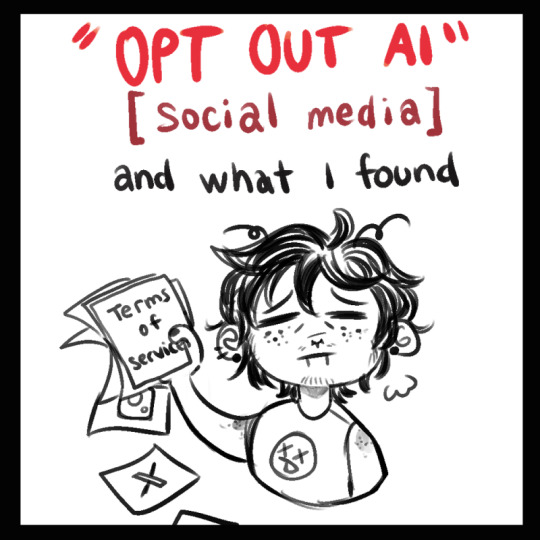
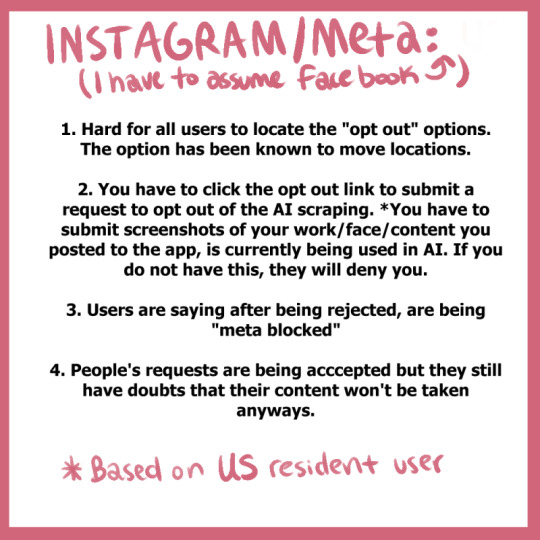
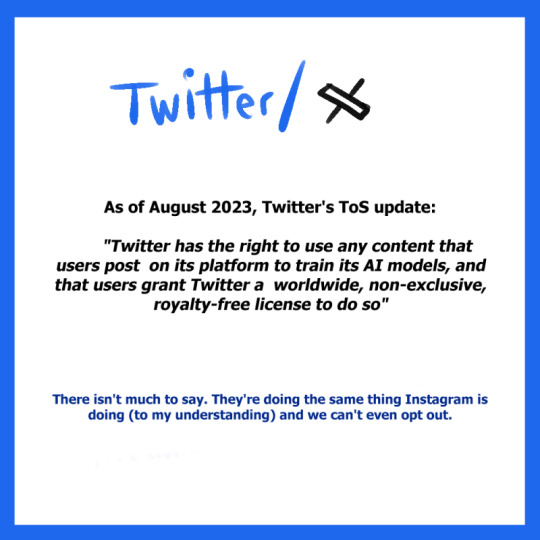
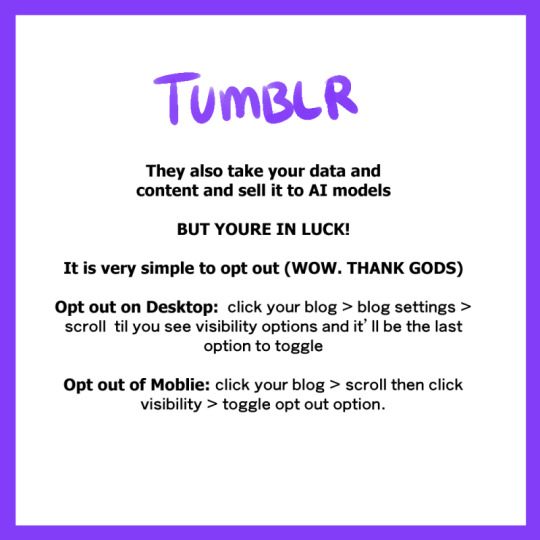
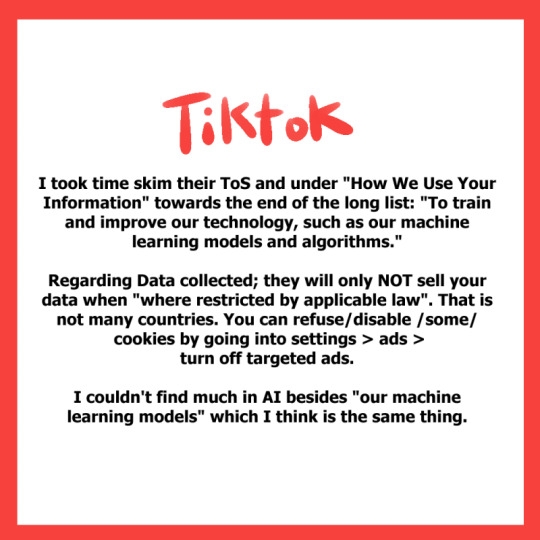
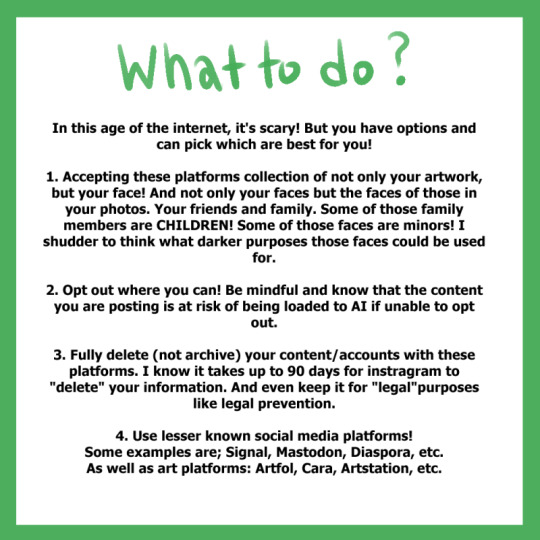
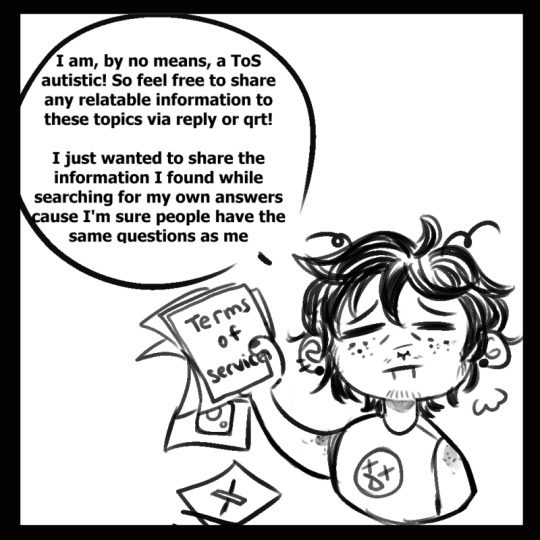
I spent the evening looking into this AI shit and made a wee informative post of the information I found and thought all artists would be interested and maybe help yall?
edit: forgot to mention Glaze and Nightshade to alter/disrupt AI from taking your work into their machines. You can use these and post and it will apparently mess up the AI and it wont take your content into it's machine!
edit: ArtStation is not AI free! So make sure to read that when signing up if you do! (this post is also on twt)
[Image descriptions: A series of infographics titled: “Opt Out AI: [Social Media] and what I found.” The title image shows a drawing of a person holding up a stack of papers where the first says, ‘Terms of Service’ and the rest have logos for various social media sites and are falling onto the floor. Long transcriptions follow.
Instagram/Meta (I have to assume Facebook).
Hard for all users to locate the “opt out” options. The option has been known to move locations.
You have to click the opt out link to submit a request to opt out of the AI scraping. *You have to submit screenshots of your work/face/content you posted to the app, is curretnly being used in AI. If you do not have this, they will deny you.
Users are saying after being rejected, are being “meta blocked”
People’s requests are being accepted but they still have doubts that their content won’t be taken anyways.
Twitter/X
As of August 2023, Twitter’s ToS update:
“Twitter has the right to use any content that users post on its platform to train its AI models, and that users grant Twitter a worldwide, non-exclusive, royalty-free license to do so.”
There isn’t much to say. They’re doing the same thing Instagram is doing (to my understanding) and we can’t even opt out.
Tumblr
They also take your data and content and sell it to AI models.
But you’re in luck!
It is very simply to opt out (Wow. Thank Gods)
Opt out on Desktop: click on your blog > blog settings > scroll til you see visibility options and it’ll be the last option to toggle
Out out of Mobile: click your blog > scroll then click visibility > toggle opt out option
TikTok
I took time skim their ToS and under “How We Use Your Information” and towards the end of the long list: “To train and improve our technology, such as our machine learning models and algorithms.”
Regarding data collected; they will only not sell your data when “where restricted by applicable law”. That is not many countries. You can refuse/disable some cookies by going into settings > ads > turn off targeted ads.
I couldn’t find much in AI besides “our machine learning models” which I think is the same thing.
What to do?
In this age of the internet, it’s scary! But you have options and can pick which are best for you!
Accepting these platforms collection of not only your artwork, but your face! And not only your faces but the faces of those in your photos. Your friends and family. Some of those family members are children! Some of those faces are minors! I shudder to think what darker purposes those faces could be used for.
Opt out where you can! Be mindful and know the content you are posting is at risk of being loaded to AI if unable to opt out.
Fully delete (not archive) your content/accounts with these platforms. I know it takes up to 90 days for instagram to “delete” your information. And even keep it for “legal” purposes like legal prevention.
Use lesser known social media platforms! Some examples are; Signal, Mastodon, Diaspora, et. As well as art platforms: Artfol, Cara, ArtStation, etc.
The last drawing shows the same person as the title saying, ‘I am, by no means, a ToS autistic! So feel free to share any relatable information to these topics via reply or qrt!
I just wanted to share the information I found while searching for my own answers cause I’m sure people have the same questions as me.’ \End description] (thank you @a-captions-blog!)
4K notes
·
View notes
Text
AD Vantage Loyalty Program Services
AD Vantage is a loyalty program company that helps businesses to retain their customers and drive revenue growth. We provide businesses with the tools and strategies they need to develop and manage effective loyalty programs, which reward customers for their repeat business and incentivize them to be loyal.
Designing and implementing loyalty programs: AD Vantage work with businesses to design and implement loyalty programs that are tailored to their specific needs and goals. We help businesses to determine what rewards and incentives will be most effective in encouraging customer loyalty, and they create the systems and processes needed to manage and track the program.
Data analytics: AD Vantage uses data analytics to track customer behavior and measure the effectiveness of loyalty programs. By analyzing customer data, we identify trends and patterns that help businesses to better understand their customers and develop targeted marketing campaigns.
Customer engagement: Our loyalty programs also play a role in engaging customers and encouraging them to participate in the loyalty program. They create marketing materials and campaigns that promote the benefits of the program, and they provide customer support to help customers understand how to participate.
Technology solutions: The loyalty programs of AD Vantage provide technology solutions that allow businesses to manage their loyalty programs, track customer behavior, and measure program effectiveness. These solutions may include software platforms, mobile apps, and other digital tools that make it easy for businesses to manage and track their loyalty programs.
Customer segmentation: We help businesses segment their customers based on demographics, purchase history, and other factors. This allows businesses to target specific customer groups with personalized rewards and incentives that are more likely to appeal to their interests and needs.
Customer feedback: AD Vantage provide businesses with tools to collect customer feedback, which can be used to improve the loyalty program and other aspects of the customer experience. This feedback can be collected through surveys, reviews, and other methods, and can provide valuable insights into customer preferences and behaviors.
Partnership and alliances: Our loyalty program can help businesses form partnerships and alliances with other companies to offer joint loyalty programs. This can expand the reach of the loyalty program and offer customers more options for rewards and incentives.
customerloyaltyprograms
loyaltyschemes
customerloyaltyprogram
#https://advan.in/loyalty-programs/#AD Vantage is a loyalty program company that helps businesses to retain their customers and drive revenue growth. We provide businesses wit#which reward customers for their repeat business and incentivize them to be loyal.#Designing and implementing loyalty programs: AD Vantage work with businesses to design and implement loyalty programs that are tailored to#and they create the systems and processes needed to manage and track the program.#Data analytics: AD Vantage uses data analytics to track customer behavior and measure the effectiveness of loyalty programs. By analyzing c#we identify trends and patterns that help businesses to better understand their customers and develop targeted marketing campaigns.#Customer engagement: Our loyalty programs also play a role in engaging customers and encouraging them to participate in the loyalty program#and they provide customer support to help customers understand how to participate.#Technology solutions: The loyalty programs of AD Vantage provide technology solutions that allow businesses to manage their loyalty program#track customer behavior#and measure program effectiveness. These solutions may include software platforms#mobile apps#and other digital tools that make it easy for businesses to manage and track their loyalty programs.#Customer segmentation: We help businesses segment their customers based on demographics#purchase history#and other factors. This allows businesses to target specific customer groups with personalized rewards and incentives that are more likely#Customer feedback: AD Vantage provide businesses with tools to collect customer feedback#which can be used to improve the loyalty program and other aspects of the customer experience. This feedback can be collected through surve#reviews#and other methods#and can provide valuable insights into customer preferences and behaviors.#customerloyaltyprograms#loyaltyschemes#customerloyaltyprogram
0 notes
Text
youtube
Welcome to FathomVerse 🦑🐟🦀
A new mobile game launching today allows anyone with a smartphone or tablet to take part in ocean exploration and discovery. Now available for download on the App Store and Google Play, FathomVerse allows players to interact with real underwater images to improve the artificial intelligence that helps researchers study ocean life.
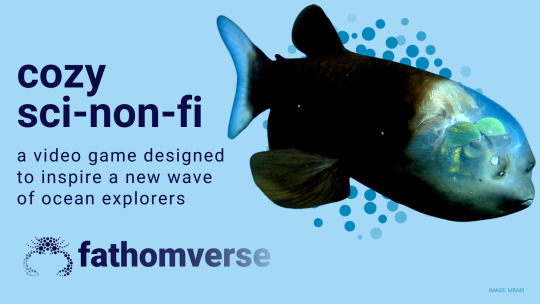
Scientists are collecting massive amounts of images and video to study marine life and assess ocean health. AI can help researchers analyze this deluge of visual data more efficiently. Before AI can be used for ocean exploration, machine learning models need to be trained to identify ocean animals.

FathomVerse seeks to address this challenge by engaging ocean enthusiasts around the world to help review and label images so AI can correctly recognize ocean animals. The game combines immersive imagery, compelling gameplay, and cutting-edge science to inspire a new wave of ocean explorers. Learn more on our website.
308 notes
·
View notes
Note
After seeing your weatherbugapp reblog i installed duckduckgo and tried it.

I don't know much about technology tbh but i downloaded this app less than 30 mins ago and in that time google tried to track me 112 times?? And they tried to collect finger prints? And my first and last name? And my gender? And my country, state and city? My gps coordinates? My postal code? My network carrier? My fricking battery level for whatever reason? Can you please tell me if this is normal at all, because i'm freaking out right now. I just turned 18 and started using mobile banking and stuff and this shit scares me
Why tf does it need to know my screen density???my system volume????my charging status????? What tf are they cooking
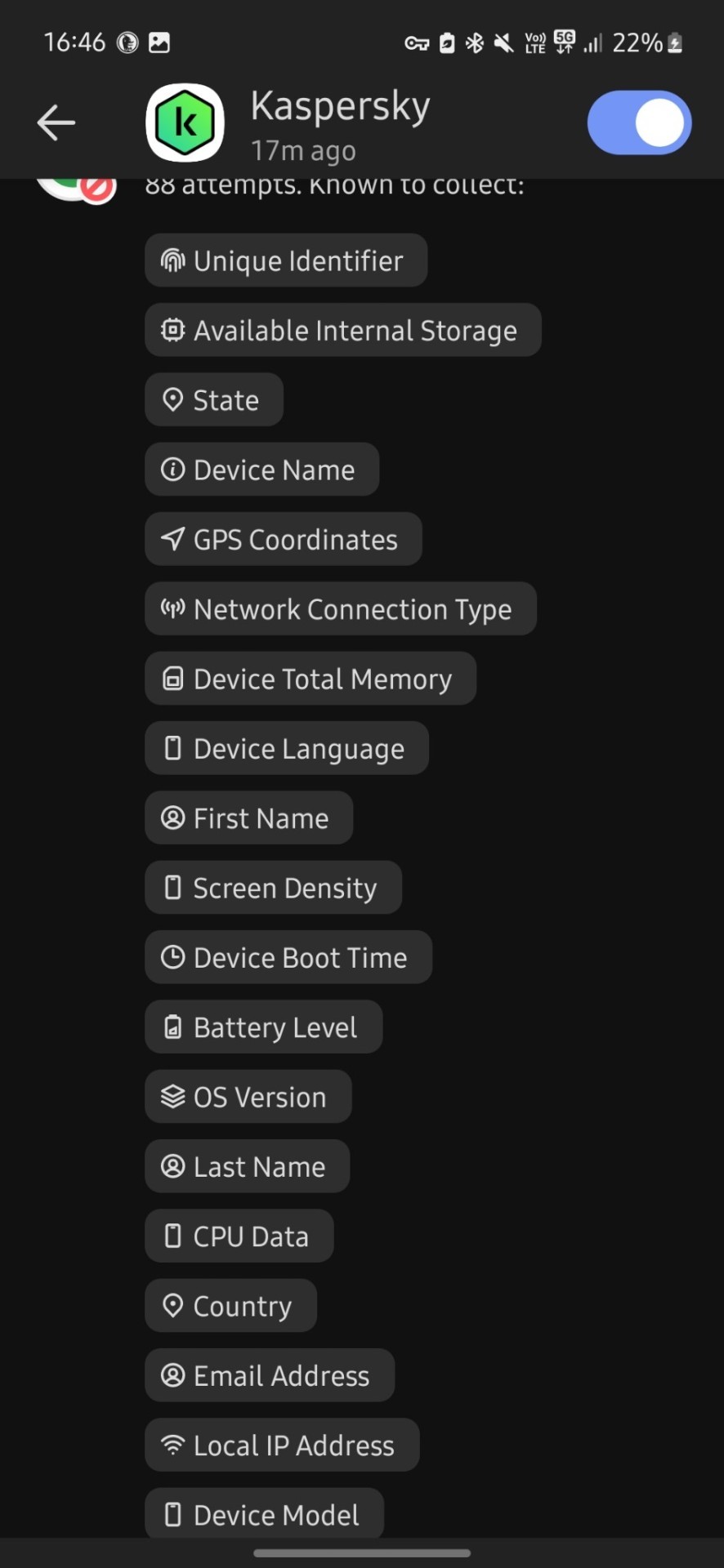
Now it's at 476 tracking attempts bro???? barely 5 mins passed.....
I condensed your three asks into one for readability!
And yeah, I'm very far from an expert about any of this, but as far as I know that's just. Normal. That's the normal amount of spying they're doing on your phone. I assume the numbers we see are to some extent because having been foiled, a lot of these scripts try repeatedly, since I can't imagine what use thousands of trackers per phone would be even to the great aggregators.
Tracking the phone stuff like screen resolution and battery level is because (apart from that definitely not being considered remotely 'private' so it's Free Real Estate) in aggregate that data can be used to track what phone use patterns are like on a demographic scale and therefore. Where the smart money is.
Almost all of this is getting sold in bulk for ad targeting and market analysis. This does presumably make it very hard to notice when like. Actually important stuff is being spied on, which is why I feel better about Having Apps with the duckduckgo app blocker thing.
My bank's app reportedly sells data to a couple aggregators including Google. Not like, my banking info, but it's still so offensive on principle that I avoid using the app unless I have to, and force stop it afterward.
The patterns that show up on the weekly duckduckgo blocker report are interesting. Hoopla attempts about two orders of magnitude more tracking than Libby, which makes sense because they're a commercial streaming service libraries pay by the unit for access, while Libby is a content management software run by a corporation that values its certification as a 'B' company--that is, one invested in the public good that can be trusted. The cleanness of their brand is a great deal of its value, so they have to care about their image and be a little more scrupulous.
Which doesn't mean not being a little bit spyware, because everything is spyware now. Something else I've noticed is that in terms of free game apps, the polished professional stuff is now much more invasive than the random kinda janky thing someone just threw together.
Back in the day you tended to expect the opposite, because spyware was a marginal shifty profit-margin with too narrow a revenue stream to be worth more to an established brand than their reputation, but now that everyone does it there's not a lot of reputation cost and refraining would be sacrificing a potential revenue stream, which is Irresponsible Conduct for a corporation.
While meanwhile 'developing a free game app to put on the game store' is something a person can do for free with the hardware they already have for home use, as a hobby or practice or to put on their coding resume. So while such apps absolutely can be malicious and more dangerous when they are than The Big Brand, they can also be neutral in a way commercial stuff no longer is. Wild world.
But yeah for the most part as far as I can make out, these are just The Commercial Panopticon, operating as intended. It's gross but it probably doesn't indicate anything dangerous on an individual level.
54 notes
·
View notes
Text
Opting Out of AI Data Collection from All Meta Apps
Idk how many of you with any Meta apps (Facebook, Instagram, WhatsApp, etc.) are aware, but Meta is using your posts to collect data. The good news is that you can opt out of their data collection. It's relatively simple.
I have heard, however, that a lot of Americans aren't seeing this feature yet. It seems that it might still be rolling out, but do make sure to keep your app updated.
Go to your profile. (I will be using Instragram in this case, but the objection will apply to your Meta account in general.)
In the top right corner, you will see the three horizontal lines (on mobile). Press that.
Select "Settings and Privacy."
Scroll all the way down to "About." Press that.
Select "Privacy Policy."
That first box at the top will have some blue hyperlinks in the text. Select "right to object." It will be in the second sentence.
Type in your reasons in the boxes. This is what I wrote:
First box: "I own all the copyright on my photography/art and I object to my work being used to train AI." Second box: "AI has been harmful towards artists and creators, stealing their work without permission to then let anyone use, manipulate, claim as their own, and in some cases, make a profit from. This is theft."
I got an email back from them within 30 minutes saying my objection has been reviewed and accepted:

66 notes
·
View notes
Text
fr you should regularly go into account settings on every site you use and make sure everything enabled is what you expected. do this BOTH via mobile apps and via browser. it isn't uncommon for browser views to offer more options than apps. this isn't even due to maybe running an outdated version of an app. apps are released for easy consent to collect personal data and to serve ads, not because their platforms want to make anything easier to access.
122 notes
·
View notes
Text

#Project Completion Report#Final Inspection Checklist#Project Handover Checklist#Punch List App#Snag List App#land survey app#Mobile Data Collection App#offline survey app#mobile form app
0 notes
Link
National firewalls are everywhere today. Sometimes, they’re sold as turnkey solutions — by both Chinese and western firms — to poor countries with very little technical capacity of their own. Spy agencies from large, powerful countries love it when poor countries install foreign-made national firewalls, as these are key to “third-party collection” (when a spy agency taps into another spy agency’s files) and “fourth-party collection” (when a spy agency taps into another spy agency that has tapped into another spy-agency’s files).
As national firewalls proliferate, so too do enforcement nexuses. After Edward Snowden revealed that US tech giants were allowing US spy agencies to plunder their user data, the EU imposed a (perfectly reasonable) data localization regulation that required US tech companies to keep Europeans’ data on servers within the EU (this regulation remains contentious and fragile).
The EU doesn’t have a regional or national firewall, so tech giants who don’t want to comply with the regulation could simply withdraw their sales offices and engineering departments and lobbyists from the EU and ignore the rule — at least to the extent that they could convince US courts not to enforce EU judgments against them.
But the EU has other enforcement nexuses it could rely upon. It could order European banks and payment processors to block payments to tech firms that ignore the localization rule. Payment processing remains a highly regulated, concentrated industry, and even if, say, Facebook was willing to give up on 520,000,000 European consumers by retreating to the USA, it’s unlikely that Visa and Mastercard would follow suit.
-They’re still trying to ban cryptography
#cryptography#lawful interception#crypto means cryptography#great firewalls#ukpoli#four horsemen of the infocalypse#enforcement nexuses#backdoors#mobile app duopolies#florida#texas#culture war nonsense#pronoun bans#abortion#data localization#third party collection#fourth party collection#spooks#big tech#cops
9 notes
·
View notes
Text
Grocery Delivery App Scraping Services | Extract Grocery Price Data
Gain a competitive edge with our Grocery Delivery App Scraping Services. Extract grocery price data from top USA, UAE, Canada, China, India, and Spain retailers.
know more: https://www.mobileappscraping.com/grocery-delivery-app-scraping-services.php
#Grocery Delivery App Scraping Services#Extract Grocery Price Data#scraped from grocery delivery mobile apps#Mobile App Data Collection
0 notes
Text
How to use data collections to level up
Researching how to level up in various directions is a good way to get a direction in how to change your life, how to glow up etc. But most of the time these resources just get liked, pinned, saved etc. and we forget these resources and just collect more without processing them.
A data collection is very helpful for getting to know yourself better through various learning experiences you've made, because you will not forget these ever and have a organised space to evaluate and make a analytical customised approach to levelling up.
EX: Hair
-> You want to improve your hair so you're collecting tips on how to heal your hair. Some of it works and some of it doesn't. You're trying to remember all the things that work for you and write some of it down. Since you do not want to loose the whole thing you still have everything saved. And the lines of helpful tips and unhelpful tips get blurred because not everything in one post is 100% for you .
Definition: What is data collecting generally
Data collection is a systematic process of gathering and measuring information on targeted variables to answer relevant questions and evaluate outcomes. This process is essential across various fields, including business, academia, and government, as it provides the foundational data needed for analysis and decision-making.
The steps of data collecting:
Decide what data to gather
Establish a deadline for data collection
Select a data collection method
Gather information
Examine your information
creating a data collection to level up
-> Organising
In the first step we are organising our saved recourses. This makes us aware of what we really need to collect. This means we are categorically looking for every post that you've saved and decide if it's important, only a bit is important or it is not important/other posts have the same/better points.
I would also make categories in a notes app. This could be notion, the mobile notes app, word, in a notebook etc. It's about what you prefer.
EX: Categories: Study techniques, Glow up, fashion tips/inspo, - finances etc.
-> Evaluating
After organising your resources you should categorise them in the categories that you created and just put a link to the Original post inside in your notes at first.
They are a reminder for what value a post gives when you're having a break.
Then you go to each post and look what tips etc. you truly like and want to apply to yourself.
After analysing a post you're deleting the link and paste the information in the right category.
-> Examining
Now you have a lot of individual tips in a category but they are not sorted.
To sort them you can look in what phase they are.
EX: Improving your studies
In studying and getting better marks there are 4 phases
before school
in school
after school
exam season
Each one of these phases has different needs for you to level up different processes.
So these would be undercategories in which you sort your collected tips in.
Now you have a starters data collection.
-> Planning and Consistency
Especially in the start you have essentially just collected tips that might work for you but the real essential data is not defined yet.
data is what 100% works for you and levels you up in one category.
So the best approach to extract this data is to systematically try out all the tips that you collected in your starter data collection. Highlight those who help you and delete those who doesn't.
#girlblogging#wonyoungism#girl blogger#pink academia#becoming her#becoming that girl#dream girl#self improvement#pink pilates princess#it girl energy#it girl#glow up era#glow up#level up#data collection#I love philosophy and solving my own questions via posts#get work done#studyblr#studyinspo#self growth#self help#self development#personal growth#growth mindset
33 notes
·
View notes
Note
Still no internet?
Captain's Log: Day 10 Without Internet - I've used up all of my mobile data and incurred ~£20 of additional charges trying to hotspot for work. I've resorted to listening to music using our record player (thank god for my Taylor Swift vinyls) and using recipes from old cookbooks.
Thankfully, Mr. LB and I were able to unbox our dvd collection for entertainment in the evenings. We've started re-watching The Hobbit and Lord of the Rings extended additions, which should last us at least 10 more days.
If this goes on any longer, I'll have no choice but to start writing fic using my local notes app.
#I'm being dramatic but it does suck#no ETA for when it will get fixed either#Just that they'll be coming back 'later this week'#I'm also not joking - I HAVE started writing fic on my phone#QOT 6 we'll get to you eventually
21 notes
·
View notes
Text

A BL Platform For Everyone
NB: Please reblog this for visibility!
A little over two years ago, me and my BL crew were in our little chat sharing recommendations.
Cat had an impressive spread sheet, Marcie and I had iCloud Notes, and it was pretty much chaos.
I looked at it and said out loud, "There has to be a better way for us to keep track of our reads and share recommendations. There has to be right?"
Cat said she wished someone would build a BL app with everything already there. Me, a developer of almost thirty years, paused while a floodlight (not a light bulb) went off in my head.
“Well I could maybe build one… cause like, I build stuff. How would that be?”
By the end of the conversation Cat had invited me to build an app for BL.
Four weeks later, in late February of 2022, digitaljuicy.com was online.
In the last couple of years, I’ve been listening to the fandom, paying attention to feedback, poured over analytics, read your responses to the Reader’s Survey and continued to craft a platform with all this in mind.
What I have been building is 100% for us... there is nothing but BL and it is an attempt to encompass ALL of BL. Not just the bits and pieces.
But for two years I've been struggling. Struggling in many ways, but specifically to get what I wanted out of the platform. I tried and failed so many times.
In September of 2022 I tried to raise venture capital to build the platform I wanted for us. I pitched it to accelerators and true blue venture capital.
Juicy is what is called 'pre-seed'. Which means were still so new and evolving, under-resourced and while there was interest, there was no joy. No funding was raised.
In December 2023, I realised it was time to rethink Juicy. i have been on the deepest dive for months rebuilding Juicy from the ground up and preparing the framework for the mobile app.
I’ve built something I want to use… and wild, I’m building it and using it as a fan at the same time. I'm at the point where it's impossible not to want to share.
And what kind of platform do I mean? At its most basic level:
You can track your reads, watches and plays
You can review and recommend the titles to the community, your friends, strangers on Twitter, your friend you're trying to corrupt outside the fandom. Your poison.
Timelines for you, for titles, for episodes, chapters… just about everything. I mean everything: The creators, the publishers, the studios, the actors... you can leave reviews and status posts on EVERYTHING. No algorithms, no force feeding... just discovery, recommendations and honest reviews by this community about our community and the industry we feed.
Collections! Lists of stuff you're reading, dropped, want to read, want to buy, love or hate, all pretty and organised and shareable..
A growing database resource of titles, tagged up to its eyeballs with a minutiae of data.. with reading an streaming links and anything else we find that we think is relevant.
But it is also a lot more than this.
I wanted it to be more than what it was. I want to turn Juicy into a mobile app, add some more functionality and more specifically, platform all of BL for its non-Asian fandom.
We get left out of so much, I feel like we need our own thing.
I don’t know about ya’ll, but I was tired of being banned on social media for sharing content. How you gonna ban me for saying a 2D fictional character needs to be shot with shite and strung with cobweb? But they did… and I know it’s not just me.
What about the creators? How do they interface with the non-Japanese or non-Korean fandoms? On which misogynistic hell site?
What about the publishers and merchandisers? What about the little Etsy sellers? Why does BL have to hidden away in the databases of mangaupdates, anisearch and anilist? Why does every single manga tracker out there seem to have pitiful listings for BL?
Is it because we’re a female or queer audience?
Look at this lil video I made:
youtube
Either way, I’ve long felt it’s time for us to do our own thing. So I’ve been building it. Pixel by pixel. Feature by feature on my own.
Juicy has been a small chat group, but I’m the only developer. We’ve always been clear about what we wanted to build: A platform for the fandom, the creators, the publishers, the merchandisers… my goal is a one-stop platform for BL and I am damn close to presenting this new iteration.
This was and remains the core of what I’m building: The largest English platform for BL on the planet. The functionality is one thing, but building a database like that is not a one-person job.
So now I need your help.
First to keep the servers online, so I can continue to build and develop and finally, finally release the mobile app. I can't tell you how much I want that.
I’m close to pushing the new Juicy 3.0 out, and I’m very in love with the work I’ve done since December. It’s a new look, and it works 1000 times better than the previous iterations of Juicy.
I just have hit a wall financially, and need your help and support to get it over the line.
Juicy's ass is fat and I been carrying her mostly alone for two solid years.
I’m going to launch a Kickstarter for this project in a bit so I can hire another developer to help with the trickier bits and fine tune the mobile app, but for now, I felt a Patreon would at least help us keep the servers up and maybe, just maybe allow us to afford a few crucial bits that will elevate your experience as a user.
And because I’m a developer, and I can do some pretty kinky shit with APIs and such, if you support this Patreon campaign, you will get some nice feature perks on the platform automagically. You won’t have to pay again to access these perks in-app later.
As many perks as I can cook up anyway, not the least of which will be access to some of the nicer functions and features I’ve already built into the platform.
When the mobile app launches, you will get it first and for free! Plus we’ve been talking about a lot of other ways we can make the platform fun beyond what I've done already.
I plan to monetise the platform in various ways, but in a profit sharing model. You contribute to the database, you contribute content, you get a share of whatever the platform makes. This is already built into the system. This will be open to anyone willing, but to Patrons first.
Finally, I'm limiting the number of people who can subscribe via Patreon to 1000 people. Once we hit that number, the rolls will be closed to new membership, and everyone directed to the platform to pay for any services or merchandise.
My goal for this group of Patrons is that you become an exclusive and tightly knit inner circle.
My hope is that you will help me actively shape what Juicy will become. Your votes and say will carry weight. Your feature requests considered and if possible implemented first.
You will get access to exclusive merchandise, exclusive giveaways and promos (like free stuff), and exclusive programming from the team.
With your help we will produce an exclusive podcast for Patrons only discussing all things BL and Juicy (honestly our conversations are generally wild and hilarious... it will be a rollick for sure), along with other content for Patrons only. We've even planned watch parties and other fun shit... I swear, we want you all to be our greatest ambassadors so we are planning as many treats as we can.
Your access on the platform will be specific to your Patreon subscription and your treatment will be VIP for the life of your subscription.
Finally, the way my auADHD are set up, I have no interest in the dramas of the BL fandom, so this is never going to be about gatekeeping access to anything. It’s about making more access possible. You can help bring us all together and make us stronger as a group.
So do you think Digital Juicy sounds like something you’d like in on?
Okute Sea
Saezuru Murmurs
#saezuru tori wa habatakanai#painter of the night#saezuru fandom#potn#thai boys love#yaoi#yaoi manga#yaoi anime#korean bl#taiwan bl#19 days#jinx mingwa#boys love#shounen ai#bl manhwa#yawhacheop#seungho x nakyum#bl comic#bl manga#bl drama#bl anime#twittering birds never fly#saezuru#yaoi bl#bl fandom#bl fanart#Youtube
37 notes
·
View notes
Text
A few years ago I wrote about how, when planning my wedding, I’d signaled to the Pinterest app that I was interested in hairstyles and tablescapes, and I was suddenly flooded with suggestions for more of the same. Which was all well and fine until—whoops—I canceled the wedding and it seemed Pinterest pins would haunt me until the end of days. Pinterest wasn’t the only offender. All of social media wanted to recommend stuff that was no longer relevant, and the stench of this stale buffet of content lingered long after the non-event had ended.
So in this new era of artificial intelligence—when machines can perceive and understand the world, when a chatbot presents itself as uncannily human, when trillion-dollar tech companies use powerful AI systems to boost their ad revenue—surely those recommendation engines are getting smarter, too. Right?
Maybe not.
Recommendation engines are some of the earliest algorithms on the consumer web, and they use a variety of filtering techniques to try to surface the stuff you’ll most likely want to interact with—and in many cases, buy—online. When done well, they’re helpful. In the earliest days of photo sharing, like with Flickr, a simple algorithm made sure you saw the latest photos your friend had shared the next time you logged in. Now, advanced versions of those algorithms are aggressively deployed to keep you engaged and make their owners money.
More than three years after reporting on what Pinterest internally called its “miscarriage” problem, I’m sorry to say my Pinterest suggestions are still dismal. In a strange leap, Pinterest now has me pegged as a 60- to 70-year-old, silver fox of a woman who is seeking a stylish haircut. That and a sage green kitchen. Every day, like clockwork, I receive marketing emails from the social media company filled with photos suggesting I might enjoy cosplaying as a coastal grandmother.
I was seeking paint #inspo online at one point. But I’m long past the paint phase, which only underscores that some recommendation engines may be smart, but not temporal. They still don’t always know when the event has passed. Similarly, the suggestion that I might like to see “hairstyles for women over 60” is premature. (I’m a millennial.)
Pinterest has an explanation for these emails, which I’ll get to. But it’s important to note—so I’m not just singling out Pinterest, which over the past two years has instituted new leadership and put more resources into fine-tuning the product so people actually want to shop on it—that this happens on other platforms, too.
Take Threads, which is owned by Meta and collects much of the same user data that Facebook and Instagram do. Threads is by design a very different social app than Pinterest. It’s a scroll of mostly text updates, with an algorithmic “For You” tab and a “Following” tab. I actively open Threads every day; I don’t stumble into it, the way I do from Google Image Search to images on Pinterest. In my Following tab, Threads shows me updates from the journalists and techies I follow. In my For You tab, Threads thinks I’m in menopause.
Wait, what? Laboratorially, I’m not. But over the past several months Threads has led me to believe I might be. Just now, opening the mobile app, I’m seeing posts about perimenopause; women in their forties struggling to shrink their midsections, regulate their nervous systems, or medicate for late-onset ADHD; husbands hiring escorts; and Ali Wong’s latest standup bit about divorce. It’s a Real Housewives-meets-elder-millennial-ennui bizarro world, not entirely reflective of the accounts I choose to follow or my expressed interests.
Meta gave a boilerplate response when I asked how Threads weights its algorithm and determines what people want to see. Spokesperson Seine Kim said what I’m seeing is personalized to me based on a number of signals, “such as accounts and posts you have interacted with in the past on both Threads and Instagram. We also consider factors like how recently a post was made and how many interactions it has received.” (A better explanation might be that Threads has a rage-bait problem, as this intrepid reporter learned.)
What scares me most about this is not that Meta has a shitbucket of data on me (old news) or that the health hacks I’m being shown might be completely illegitimate. It’s that I might be lingering on these posts more than I realize, unconsciously shoveling more signals in and anxiously spiraling around my own identity in the process. For those of us who came of age on the internet some 20 to 30 years ago, the way these recommendation systems work now represents a fundamental shift to how we long thought of our lives online. We used to log on to tell people who we were, or who we wanted to be; now the machines tell us who we are, and sometimes, we might even believe them.
As for Pinterest, I granted the company access to my account so they could investigate why the app recommends ageist, AARP-grade content to me in its emails. It turns out I hadn’t actively logged in to the app in over a year, which means the data it has one me is, ironically, old. Back then I was researching paint, so the app thinks I’m still into that.
Then there’s the grandma hair: Not only had I searched on Pinterest for skincare products and hairstyles in the long-ago past, but Pinterest gives a lot of weight to data from other users who have searched for similar items. So perhaps those other, non-identifiable users are into these hairstyles. The company claims its perceived relevance for recommendations has improved over the past year.
Pinterest’s suggested solution for me? Use Pinterest more. Un-pin stuff I don’t like. Threads also suggested I can fine-tune my own feed by swiping left to hide a post or tapping a three-dot menu to indicate I’m not interested. It’s on me, young buck. In both cases, I’m supposed to tell the algorithms who I am.
I’m supposed to do the work. I’m supposed to swipe more. I’ll be so much better off if I do. And so will they.
12 notes
·
View notes